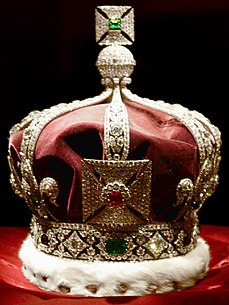The King's Crown
A Quick Skit for Easter Lenten Season--No Memorization RequiredYour purchases and donations to the site keep ideas like this available.

(Based on the Parable of the Tenant, Luke 20:9-18)
Actors: Narrator, King, Messengers (1, 2, and 3), People (the rest of the children).
Props: King's throne, crown, robe, scepter, and Bible-time clothes (use robes, or drape large pieces of cloth over shoulders, head coverings, shawls, etc. The Messengers and People dress in Bible-time clothes. Write #1, 2, and 3 on separate sheets of paper and then pin them on the Messengers. Have the People stand in a half-circle around the King's throne, with the Messengers standing behind the King.)
Children perform according to Narrator's command (the bolded italics are for prompting the children to do the action).
Narrator: A long time ago their lived a very famous, benevolent king, which means he was very kind and generous. The king ruled from his royal throne. He wore a fine royal robe, a beautiful crown, and held the royal scepter in his hand.
King, put on your royal clothing and crown, and then sit on your throne.
One day the king received word that his people were mistreating one another and refused to obey the kingdom rules. So he raised his royal scepter and decreed that his messengers were to go and remind the people of his goodness, and warn them of the consequences of disobeying the royal rules.
King, tell your #1 Messenger to warn the people to obey the kingdom rules.
So the #1 Messenger went to the people and told them to obey the king and stop mistreating one another.
Messenger #1, tell the people to obey the king and stop mistreating one another.
But when the #1 Messenger went to the people, they beat him and sent him away.
People, beat that messenger (pretend)
and get rid of him.
So, the #1 Messenger returned to the king and told him what happened. Then the King sent his #2 Messenger to the people. He too told the people to stop mistreating one another and obey the king.
Messenger #2, tell the people to stop mistreating one another and obey the king.
When the #2 Messenger went to the people, they also beat him and sent him away.
People, beat that messenger
and get rid of him.
So the #2 Messenger returned to the king and told him what happened. But the king was a very patient king, so he sent his #3 Messenger to warn the people again.
Messenger #3, tell the people to stop mistreating one another and obey the king.
And as you might guess, Messenger #3 was beaten too, and then reported to the king what had happened.
By now, you would think that the king would be so unhappy with his people that he would order all of them killed. But that is not what happened. Can you guess what the king did? (Have children sit down
to receive their answers.)
The King stood up from his throne, put down his royal scepter. Took off his royal robe, removed his crown, and went to the people to speak to them himself! And do you know what they did? (Have the King
sit with the children to receive their answers.)
They beat him too, and then killed him! Why do you suppose they did this? (Receive answers)
What should have happened to those people? (They deserved to be punished for disobeying and killing the King.)
This story is really about Jesus and us. For hundreds of years God sent his messengers, known as
"prophets," to warn people to obey and follow him. But they were rejected, beaten, and killed. Finally, God came to earth as a man. Jesus, gave up his crown, took off his royal robes, and left his heavenly kingdom to save all people. But what happened to him? (Receive answers)
He was rejected, beaten, and killed. But that's not the end of the story! Unlike the King in our story, Jesus overcame death by rising from the dead, which is why we celebrate Easter. Today is Lent, the first day of the Easter season. Lent
means, "lengthening," because at this time of year, springtime, the
days are longer, there are more daylight hours. During the forty days of Lent* leading up to Easter, people sometimes give up something they like to eat or enjoy doing; this is called "fasting." Why do you suppose people give up something? (Receive answers)
Jesus gave up his royal position; he willingly gave up his life for ours. He died on the cross to take the punishment we deserve for sinning. He cleansed us to make us right before God. When we give up
something during Lent, we are reminded of what Jesus did for us, and can thank him for his great
benevolence. Do you remember what that word means? (Kindness and generosity)
The Bible says whoever wants to be Jesus' disciple—his follower, his child—he
must deny himself, take up his cross, and follow him (Mark 8:34).
What does it mean to deny ourselves and take up our cross? (Receive answers)
When we deny ourselves, we say, "No," to our will and "Yes," to
God's will. We don't put ourselves first, but we put God and others first. Carrying our cross means putting to death our sinful desires; those things that make us say "NO" to God. When we ask Jesus to be our Savior and Forever Friend, the Holy Spirit gives us the power to do God's will. If you haven't asked Jesus to cleanse your sin and forgive you, you can do it today.
Suggested Prayer: Dear Jesus, I am a sinner; I say and do wrong things. I have disobeyed your rules. Thank you for taking the punishment I deserve, when you died on the cross. Thank you for cleansing my sin. Thank you for loving me and forgiving me.
Thank you for rising from the dead so I too can live with God for eternity. Help me to deny myself and
follow you. Amen.
Copyright 2013 Sarah A. Keith
SundaySchoolNetwork.com
*For a coordinating lesson, check out Ash Wednesday &
Lent.
If you like this resource, the you're sure to love these Bible
resources:
It's
in the Bag, 52 Bible Talks for Children's Ministry
Lights,
Camera, Action Bible Skits

Subscribe to our Newsletter - Learn More
Site Map